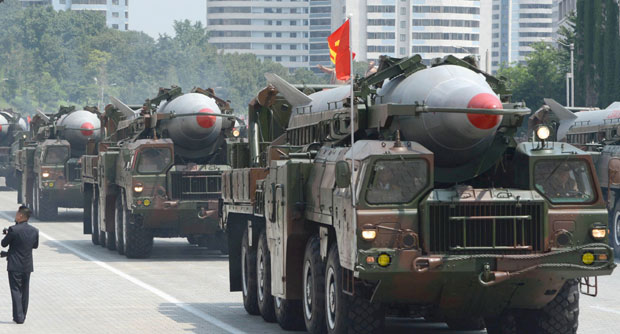N. Korea test-fires missiles as Obama hosts summit

In this July, 2013 photo, military trucks carry Rodong missiles during a military parade at Kim Il Sung Square in Pyongyang, North Korea. North Korea on Wednesday, March 26, 2014, test-fired two medium-range ballistic missiles, South Korea and the U.S. said, a defiant challenge to a rare three-way summit of its rivals Seoul, Tokyo and Washington that focused on the North’s security threat. AP/Kyodo News / JAPAN OUT, MANDATORY CREDIT
SEOUL, Korea—North Korea test-fired two medium-range missiles Wednesday, as US President Barack Obama hosted a landmark Japan-South Korea summit and pledged “unwavering commitment” to Tokyo and Seoul in the face of Pyongyang’s nuclear threat.
South Korea’s defense ministry said both ballistic missiles flew 650 kilometres (400 miles) into the Sea of Japan, upping the ante after a series of shorter-range launches by the North in recent weeks.
Defense Ministry spokesman Kim Min-Seok said the speed and range suggested they were Rodong-class missiles with a maximum range of between 1,000-1,500 kilometres.
“This missile is capable of hitting not only most of Japan but also Russia and China. So it is a fairly dangerous missile,” Kim said, adding they appeared to have been fired from mobile launchers near Pyongyang.
UN Security Council resolutions prohibit North Korea from conducting any ballistic missile tests.
Article continues after this advertisementNorth Korea last tested a Rodong missile, also known as Nodong, in July 2009, following UN condemnation of its second nuclear test in May of the same year.
Article continues after this advertisementKim said the tests were clearly timed to coincide with the summit in the Hague between Obama, Japanese Prime Minister Shinzo Abe, and South Korean President Park Geun-Hye.
“The North is boasting its military capability to grab the attention of the international community,” Kim said.
He added that Seoul and Washington would consider taking the issue to the United Nations.
‘No signs’ of nuclear test
Warning that North Korea could be building up towards a major provocation, Kim said the South was closely monitoring the situation, but added here were “no signs” of Pyongyang preparing an imminent nuclear test.
Over the past four weeks, North Korea has conducted multiple launches of short-range Scud missiles and rockets to coincide with the annual joint military drills South Korea is conducting with the US.
South Korea condemned the Scud launches as a “reckless provocation” but stopped short of calling for UN sanctions, given the short range and a recent easing of North-South tensions.
The North Korean military had defended the tests as “ordinary military practice”.
Wednesday’s trilateral summit in the Hague came as Obama sought to help repair strained ties between two of the United States’ closest Asian allies and key partners in the effort to curb North Korea’s nuclear programme.
“Over the last five years, close cooperation between the three countries succeeded in changing the game with North Korea,” Obama said.
“Our trilateral cooperation has sent a strong signal to Pyongyang that its provocations and threats will be met with a unified response,” he added.
Relations between Tokyo and Seoul are at their lowest ebb in years, mired in emotive issues linked to Japan’s 1910-45 colonial rule and a territorial dispute, as well as Japan’s use of South Korean “comfort women” as sex slaves in wartime brothels.
Washington has placed a priority on improving those ties, fearful that an open rift would undermine the three countries’ united stance against North Korea’s nuclear ambitions.
Calibrated tests
Yang Moo-Jin, a professor at the University of North Korean Studies in Seoul, said the tests were a carefully calibrated “show of force” aimed at the leaders in the Hague.
Yang noted that previous Rodong tests had been launched from North Korea’s east coast, and that firing them from near Pyongyang had curtailed their reach into the Sea of Japan.
“If they had gone closer to Japan, that could have created a serious political backlash, not only from Japan but also possibly Russia,” Yang said.
“It’s a clear violation of UN resolutions, but the North is willing to risk sanctions to showcase its capabilities and press the US, Japan and the South to resume six-party talks,” he added.
The six party negotiations on the North’s nuclear programme — also involving China, Russia and the North — were suspended in 2009.
Seoul and Washington have refused to consider a resumption until North Korea makes a tangible commitment to denuclearisation.
South Korea’s military exercises with the United States, which will wind up next month, are an annual source of North-South tension, with Pyongyang denouncing them as rehearsals for invasion.
Last year they coincided with an unusually sharp and protracted surge in military tensions that saw North Korea issuing apocalyptic threats of pre-emptive nuclear strikes.
By contrast, this year’s drills began as relations between Seoul and Pyongyang were enjoying something of a thaw.
They overlapped with the end of the first reunion for more than three years of families divided by the Korean War — an event that raised hopes of greater cross-border cooperation.
RELATED STORIES
N. Korea test-fires 30 short-range missiles into sea – Yonhap